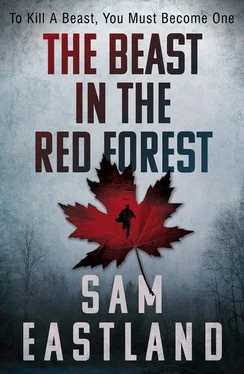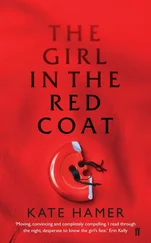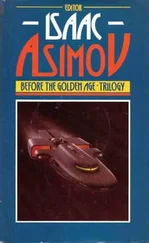Sam Eastland - The Beast in the Red Forest
Здесь есть возможность читать онлайн «Sam Eastland - The Beast in the Red Forest» весь текст электронной книги совершенно бесплатно (целиком полную версию без сокращений). В некоторых случаях можно слушать аудио, скачать через торрент в формате fb2 и присутствует краткое содержание. Год выпуска: 2013, ISBN: 2013, Издательство: Faber & Faber, Жанр: Исторический детектив, на английском языке. Описание произведения, (предисловие) а так же отзывы посетителей доступны на портале библиотеки ЛибКат.
- Название:The Beast in the Red Forest
- Автор:
- Издательство:Faber & Faber
- Жанр:
- Год:2013
- ISBN:9780571281466
- Рейтинг книги:4 / 5. Голосов: 1
-
Избранное:Добавить в избранное
- Отзывы:
-
Ваша оценка:
- 80
- 1
- 2
- 3
- 4
- 5
The Beast in the Red Forest: краткое содержание, описание и аннотация
Предлагаем к чтению аннотацию, описание, краткое содержание или предисловие (зависит от того, что написал сам автор книги «The Beast in the Red Forest»). Если вы не нашли необходимую информацию о книге — напишите в комментариях, мы постараемся отыскать её.
The Beast in the Red Forest — читать онлайн бесплатно полную книгу (весь текст) целиком
Ниже представлен текст книги, разбитый по страницам. Система сохранения места последней прочитанной страницы, позволяет с удобством читать онлайн бесплатно книгу «The Beast in the Red Forest», без необходимости каждый раз заново искать на чём Вы остановились. Поставьте закладку, и сможете в любой момент перейти на страницу, на которой закончили чтение.
Интервал:
Закладка:
The meandering of his thoughts was interrupted as the Jeep came to a sudden halt, slewing almost sideways in the mud.
‘What happened?’ asked Kirov, who had barely saved himself from being thrown out of the vehicle.
Zolkin didn’t reply. He left the engine running and launched himself from behind the wheel, drawing the pistol from his belt.
Seeing the gun, Kirov hauled out his Tokarev, jumped from the car and dived into the wide ditch, which was chest deep in water. The crack of the sergeant’s gun was the last thing Kirov heard before he went under. A moment later, he popped to the surface, spluttering out a mouthful of the oil-tinted ooze. The gunfire continued, but Kirov couldn’t tell what the driver was shooting at since his view was obscured by the wall of mud in front of him. He scrambled up the side of the ditch, one hand clawing at the dirt slope and the other still gripping his gun.
The shooting stopped abruptly and Kirov knew the man’s magazine must be empty. He rolled on to his back and chambered a round in the Tokarev, catching sight of his cap floating upside down in the ditch water like a child’s lopsided boat.
Cautiously, Kirov raised his head, ready to fight off the ambush into which he felt certain they must have driven. Instead, what he saw was the driver, standing in the middle of the road, the pistol tucked into his belt. In each hand, the man held a dead chicken. ‘What on earth are you doing, Comrade Major?’ asked the sergeant.
For the first time, Kirov became aware of the cold slime which filled his boots, the trickles of grit running down into his eyes and the taste of dirty water, rank and metallic in his spit. ‘What am I doing?’ he bellowed in reply. Then he sloshed back to the bottom of the ditch, retrieved his hat and squashed it on to his head. ‘If this is how you drive a car,’ he called out, ‘I don’t think you’ll last long in Moscow! And what are you doing with those birds?’
‘They’re for you, as well, of course,’ the driver told him, as he tossed the chickens into the back of the vehicle, splashing the seats with blood and feathers.
Kirov didn’t reply. He returned to the Jeep, climbed in, and stared off down the road. Water seeped from his cap and trickled down the side of his face.
‘I just couldn’t pass up-’ the sergeant began to explain.
‘This was a brand-new uniform!’ interrupted Kirov.
They finished their journey in silence.
Coils of smoke snaked upwards from the devastated centre of the town, obscuring the powder-blue sky. From what Kirov could see, not a single home was left intact.
Slowly the Jeep made its way forward over broken glass and pieces of smashed stone. Here and there, work crews made up of German prisoners were clearing the rubble, pitching brick after fire-blackened brick into rusty wheelbarrows.
In what had once been the display window of a shop stood a mannequin of a woman, naked except for a helmet which someone had put on her head. With one arm extended, her crumbled plaster fingers seemed to beckon them, like a leper begging for charity.
In the middle of this bombed-out street, their progress was halted by a huge crater, at the bottom of which a 20-ton Russian T34 tank lay upside down. There was no way to get past on either side.
Kirov climbed out of the Jeep, shouldering the bag, which had escaped being soaked in the ditch. Leaving the Jeep behind, the two men continued on foot.
Memo from Samuel Hayes, Secretary, US Embassy, Moscow, to US Ambassador Joseph Davies, Hotel President, Paris, November 5th, 1937
Ambassador — I would draw your attention to the unfortunate situation of Mrs William Vasko who, you might recall, wrote to you earlier this year concerning the arrest of her husband, William Vasko, a worker at the Ford Plant in Nizhni-Novgorod. As you instructed, no comment was made concerning the arrest. Mrs Vasko and her two children‚ whom she believes are now under surveillance by Soviet police, are now living in a homeless shelter here in Moscow.
Mr Vasko is only one of hundreds of arrests of American citizens reported to have taken place this year. I believe the real number may extend into the thousands. The Soviet government has furnished us with no information regarding any of these cases and we have, at present time, no way of ascertaining the whereabouts of these people.
May I impose upon you, Ambassador, to employ your considerable influence with Comrade Stalin to open a window into this phenomenon, so that we might take steps towards affording to these citizens of our country the legal assistance which is theirs by right?
I need not tell you that, with winter already upon us, significant adverse publicity could be generated if word were to spread that American women and children were freezing to death in the streets of Moscow while no action was taken by our own Embassy.
Sincerely,
Samuel Hayes, Secretary, US Embassy, Moscow
In spite of the damage, Rovno still showed signs of life.
A woman with soot-smeared hands picked through a broken chest of drawers which had somehow found its way into the middle of the road. She plucked out neatly folded undershirts and handkerchiefs, laying some over her arm to take away. The rest, she folded up, dappling them with smoky fingerprints, and replaced inside the drawer.
In the next street, a boy wearing a pilot’s leather flying helmet walked past them. Around his neck, he carried a belt of machine-gun bullets, like the sash of an Orthodox priest.
On a wide boulevard which cut through the centre of the town, a group of soldiers huddled around the wreck of a German aircraft. They were sawing off pieces of the aluminium wings and melting the metal over a fire. Once the aluminium had liquefied, they poured it into a mould shaped like a spoon which they had carved into a brick. Over this, they set another brick and bound the two together with wire. They had a production line of bricks stacked along the sidewalk, and dozens of new-made spoons were cooling in a bucket of water.
The plane was a German Focke-Wulf Fw 190, although little remained of it now. The propeller blades had been sheared off, along with the entire tail section, which now lay at the other end of the street. Bare metal showed through its camouflage paint, whose hazy black and green ripples resembled the pattern on a mackerel’s back.
In the mangled cockpit, minus his flying helmet, sat the pilot, still strapped into his seat. His chin rested on his chest. His eyes were closed. He looked almost peaceful, except for the fragment of propeller, as long as a man’s arm, which protruded from his chest.
They walked on, stepping over wooden beams puffed and blackened by the fires which had carbonised them.
At last, they stopped outside a house whose front door had been blown away, leaving only shards of wood attached. Now a piece of burlap sack hung in its place.
Zolkin pulled aside the burlap and gestured down a staircase, which leaned drunkenly sideways as it descended into the darkness. From somewhere down below came the clattering of typewriters. ‘Colonel Andrich is down here.’
Leaving Zolkin to wait in his Jeep, Kirov descended the staircase. At the bottom, he entered a small room with a low ceiling where case upon case of rifles, grenades, land mines, canned rations and field telephones had been stacked against the walls.
In the centre of this room, two women faced each other across a single desk. They wore heavy, knee-length army-issue skirts and gymnastiorka tunics. The sound of tapping keys filled the air, punctuated by the rustle of carbon paper and the whiz and ping of the return arm being struck. Each was so absorbed in their work that they did not even glance up to see who had entered the room. The women smoked as they typed. Ash fell in amongst the keys.
Читать дальшеИнтервал:
Закладка:
Похожие книги на «The Beast in the Red Forest»
Представляем Вашему вниманию похожие книги на «The Beast in the Red Forest» списком для выбора. Мы отобрали схожую по названию и смыслу литературу в надежде предоставить читателям больше вариантов отыскать новые, интересные, ещё непрочитанные произведения.
Обсуждение, отзывы о книге «The Beast in the Red Forest» и просто собственные мнения читателей. Оставьте ваши комментарии, напишите, что Вы думаете о произведении, его смысле или главных героях. Укажите что конкретно понравилось, а что нет, и почему Вы так считаете.











